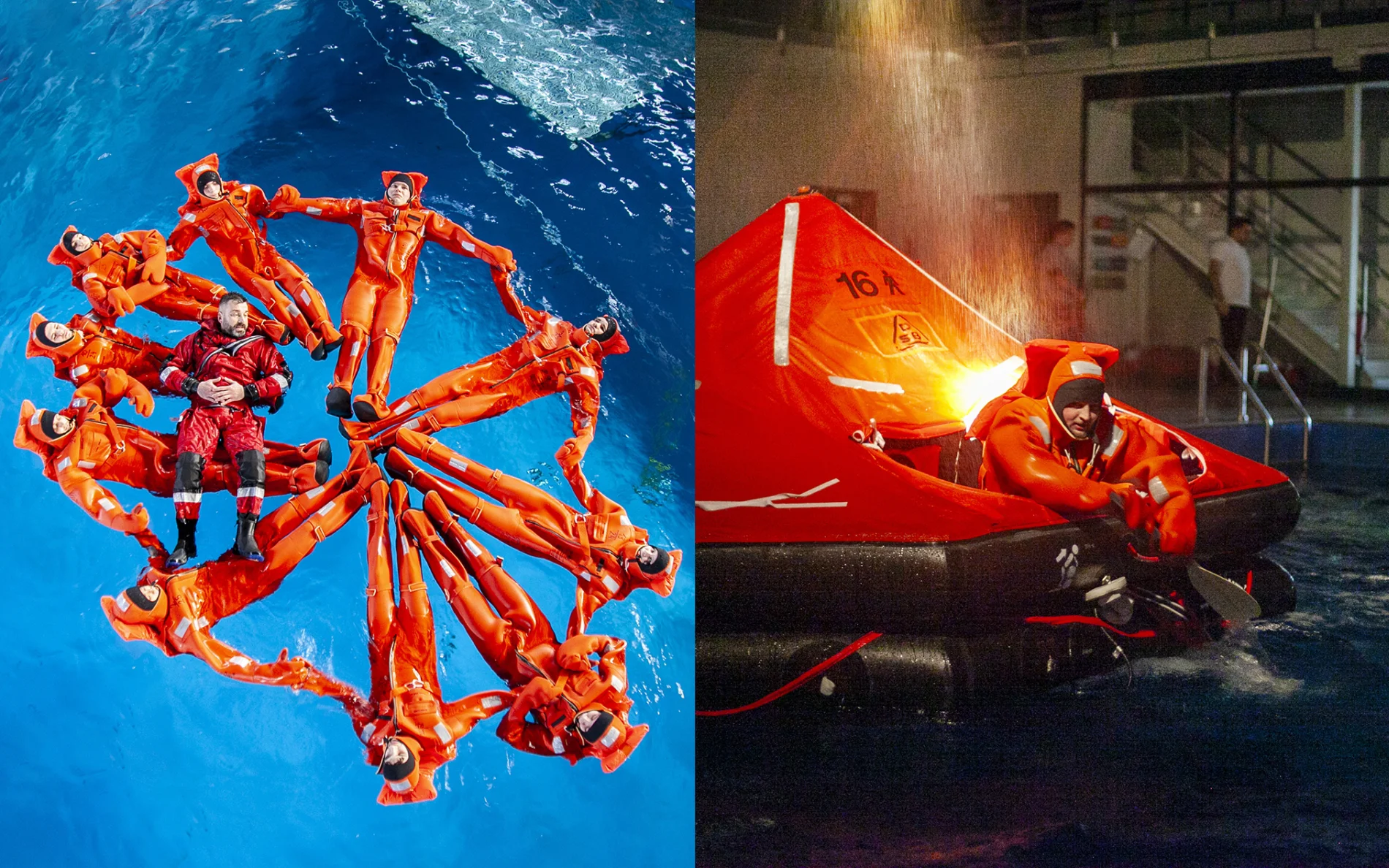Course
Navigation
(in English)

Type of studies: undergraduate
Language: English
Duration: 4 years (8 semesters)
Mode of study: Full-time studies
Degree: Engineer
Timeframe: Enrolment is open 18 May 2026
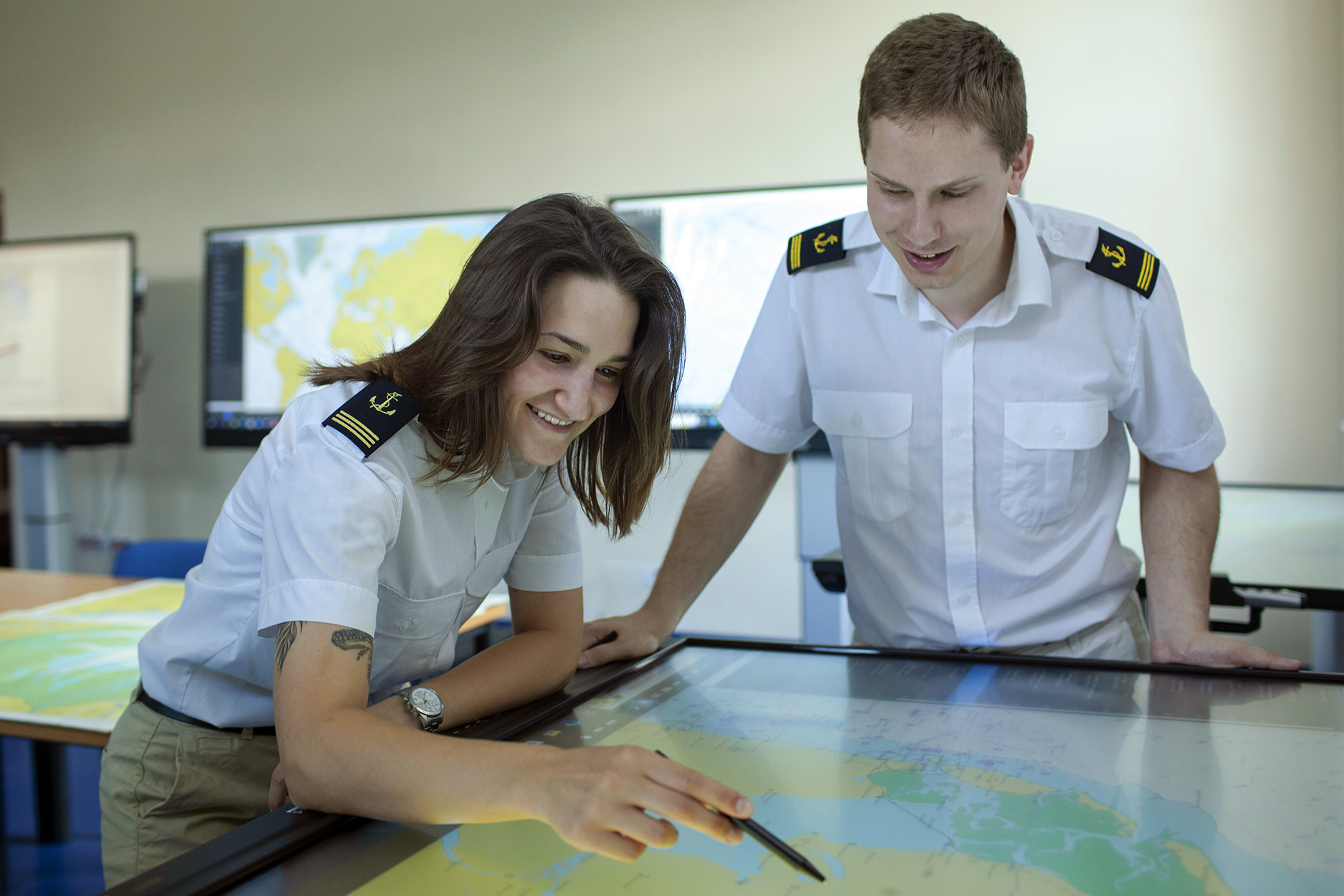
Enrolment is open from 18 May 2026.
POLISH CITIZENS
The MUS Admissions Committee takes into account grades in the following subjects:- Polish language,
- mathematics
- modern foreign language at a basic level.
chemistry, physics, geography, computer science, mathematics.
If you have any questions about admissions - contact us via chat (available during the admissions period).
Before enrolling in any degree programme carried out in English, all candidates are required to take an English language test.
Exemptions from the test can be granted to the candidates who:
- speak English as their mother tongue,
- hold the Cambridge First Certificate or an equivalent document,
- graduated from high school or college with English as the language of instruction,
- completed a degree programme with English as the language of instruction,
- completed a degree programme in Poland and received at least B grade on their final exam in English.
INTERNATIONAL CANDIDATES
Please check here: Apply step by step which documents you can use to prove your English language proficiency.More information for international candidates >> marine-edu.com
RESULTS
The University Admissions Committee oversees the enrollment process for courses.Admission results can be checked on the MUS admissions website >> https://irk.pm.szczecin.pl/Default.aspx
Candidates who have been refused admission through an administrative decision of the Admissions Committee have the right to appeal to the Rector of the Maritime University of Szczecin within 14 days of receiving the decision, through the Admissions Committee (applies to Polish citizens).
Candidates who have been refused admission through an administrative decision of the Admissions Committee have the right to appeal to the Rector of the Maritime University of Szczecin within 14 days of receiving the decision (applies to international candidates).
Specialty
Maritime Transport
Description:
Marine navigation undergraduate courses are conducted by a highly skilled and experienced team of dedicated lecturers, with the help of the latest available technology used to train top-class engineers. Our students have access to modern equipped laboratories, training rooms, ship's bridge simulators and training and research vessel.
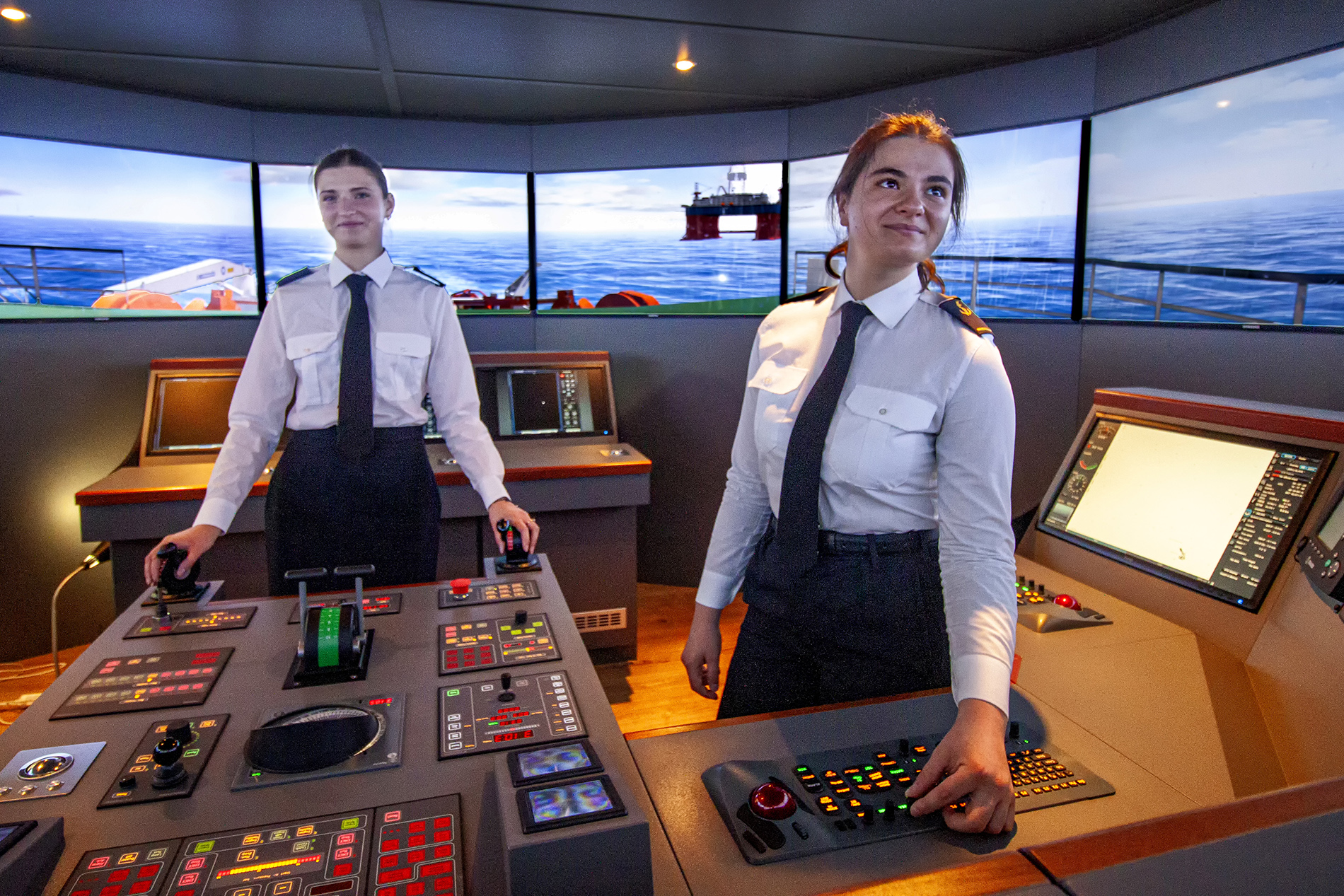
Our facilities and courses meet international standards requirements. The graduates can apply for a job worldwide as our diplomas and degrees are recognized internationally.
Navigation courses provided by our University prepare the graduates for a wide spectrum of career opportunities in the global maritime economy.
The hands-on experience gained in the most heavily funded and fast-growing high-tech sector allows our students and graduates to acquire and develop a specific set of skills and knowledge to respond and adapt quickly to changes in the job market.
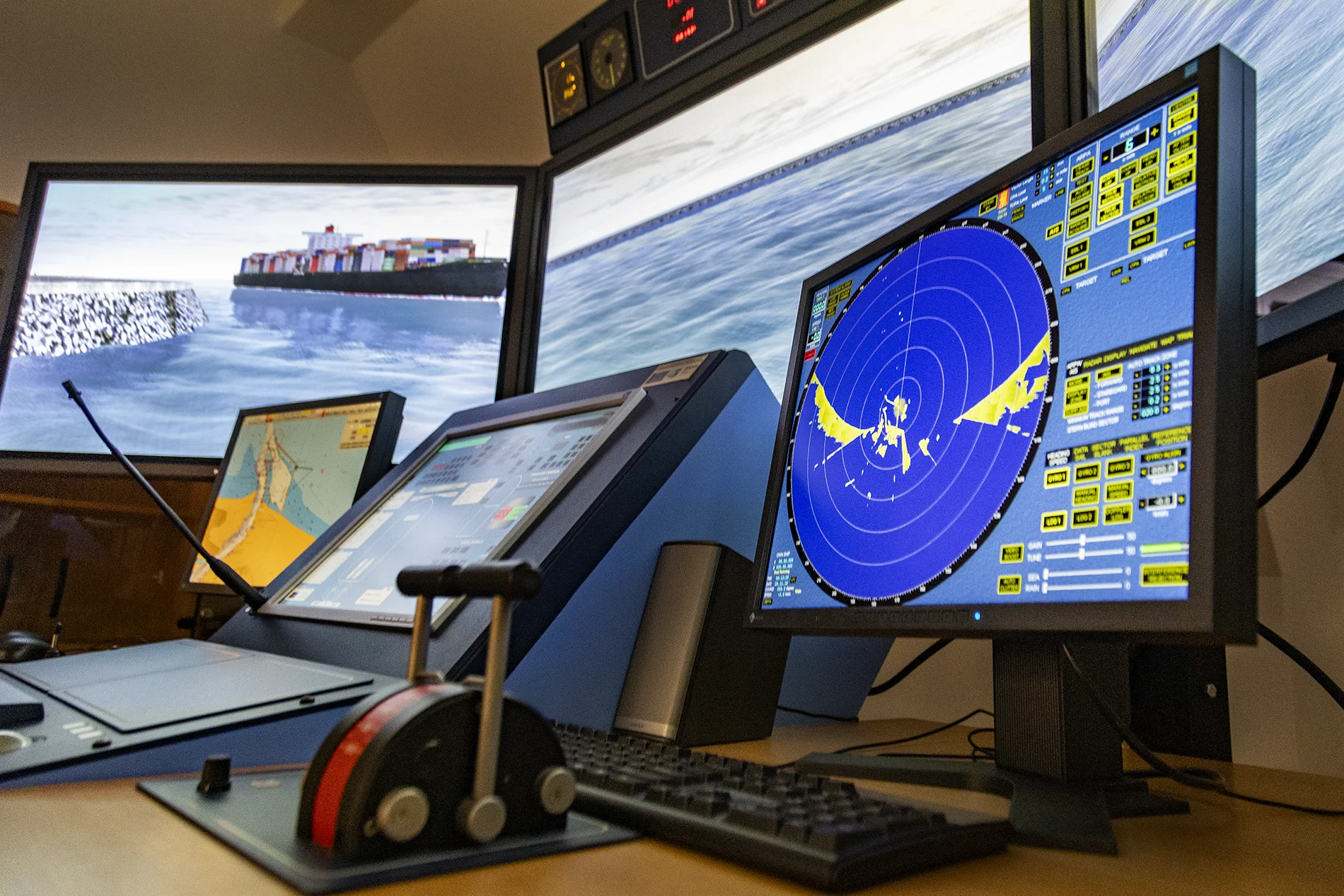
Before the satellite systems came into widespread use on land, sailors used them in their work on ships. The first prototypes of computers were utilized in science to calculate predictions of astronomical tides, which navigators analyze on a daily basis. Wind farms producing renewable energy - this is already an everyday part of a navigator's job. Your colleagues will lay fibre optic cables in the cities’ networks, you will use them to connect the continents. You will get to know the powerful force of the ocean and sea, you will visit many countries, and you will get used to working in international teams, among people of different cultures and languages. Spread your wings, rise to a challenge and follow your dreams with us.
Our student testimonial:
Why is it worth it?
Navigation course opens the door to an ever-changing international job market with a choice of multiple regions, companies, and the terms of contracts.
Most graduates, within 12 months of completing the course, develop a fast track career advancement.
By choosing to study Navigation at MUS, you will develop a career at sea or on land, in the maritime economy or any other field - the possibilities are endless.
Your future work will be demanding, but also, it will be a life challenge that would give a lot of satisfaction, and above all - a well-paid job. This kind of work shapes characters, the ability to adapt quickly to change and the need for continuous self-education.
Our graduates gain a valuable diploma from a recognized maritime university, that is committed to keeping up to the highest international standards.
Highly skilled and experienced maritime staff among our dedicated lecturers provides a practical approach to the knowledge.
You can study in an exciting, friendly city, at the University with over 75 years of history and live on the best campus in the city - university buildings, dormitories, library, reading rooms, swimming pool, clubs, theatres, cinema, parks and shopping centres - all at your fingertips, within a short – one and a half of kilometre - walking distance.
Aerial view of Maritime University of Szczecin and its campus

From Szczecin, through Berlin (just 2h away by bus) and the nearby port of Świnoujście, you can easily get to the other European destinations by air or by sea.
Work
Navigation graduates can take up a job not only in the maritime sectors but also find employment opportunities in other industries on today's job market.
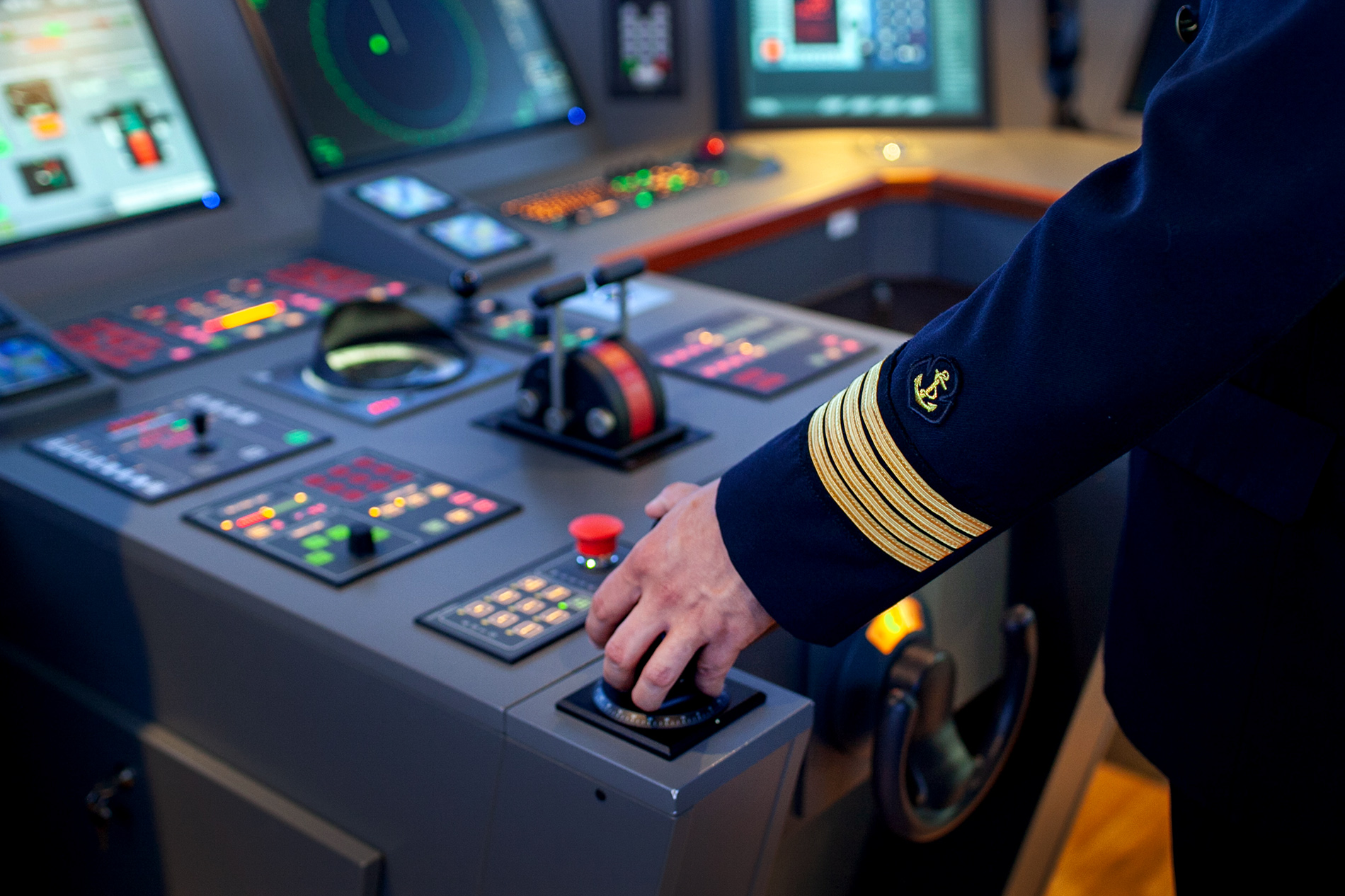
In particular, they can work as:
- seafarers of the operational and management level (officers and captains, master mariners) on merchant ships in international, domestic and inland navigation,
- Seafarers and employees of the offshore sector, including mining and renewable energy resources services (offshore wind farms),
- in the maritime services sector: tug boats, waterways and marine ports construction and maintenance,
- officers and captains of the modern sea fishing fleet and mariculture staff,
- officers captains and masters mariners of the passenger fleet (ferries, sea and ocean-going passenger ships, cruise ships, as well as all types of commercial yachts) employees of hydrographic services, border guards, maritime SAR (Search and Rescue) service,
- maritime pilots, coastal inspection stations and vessel traffic management staff,
- after gaining relevant maritime experience, as technical consultants, experts on cargo operations,
- insurance companies inspectors, maritime classification and certification services employees,
- experts in ship equipment,
- our graduates also find employment in state and local government administration and as shipping company executives or maritime recruitment agencies.
Degree Programme
Our University education programme is in line with The International Convention on Standards of Training, Certification and Watchkeeping for Seafarers (STCW), as amended. The study plan includes 6 semesters of classes and 2 semesters of onshore (inland) and offshore internship. Speciality in this course:
Maritime Transport - prepares you for work on different types of transport ships: bulk carriers, container ships, oil tankers, gas carriers, chemical tankers, ferries, car ferries, passenger ships,
Students are obliged to pass the exams in all subjects included in the study plan. They are also required to prepare a report on their mandatory maritime internship, an engineering thesis and to pass a final exam. Graduates receive an engineer's degree. Having completed the requirements specified in the regulation of the Minister for Maritime Economy regarding the training and professional qualifications of seafarers. Graduates are qualified to become officers of the ship at the operational (officer of the watch) and management (chief officer and master mariner) level.
We encourage the graduates to take an opportunity and continue their studies in Navigation on a master's degree course. In such a case, the obligation to complete a maritime internship after the undergraduate course is postponed until the next stage of the studies is completed.
Graduate profile
Graduates from The Maritime University of Szczecin, the Navigation Faculty are well prepared both theoretically and practically to work as deck officers on ships, within organizations related to maritime administration, the safety of shipping, shipowner services and other branches of the maritime industry.
Our graduates have:
- excellent professional background,
- modern technical knowledge,
- ability of self-education,
- ability to implement problem-solving solutions
- physical fitness,
- high-stress resistance,
- ability to work in a team,
- high sense of duty and responsibility.
Outlook for graduates
Navigation graduates leave our University with professional knowledge, skills and competencies in line with the requirements of the international STCW Convention. They can pursue careers in a wide range of maritime industry branches, starting from ashore services, highly specialised merchant fleet, through the fishing industry, passenger and industrial fleet.
Both, the development of sea and ocean exploration technologies and trade globalisation are providing an overall positive outlook for the world's maritime economy. Graduates in Navigation have excellent career opportunities at all kinds of transport vessels, including offshore services, oil platforms, or on the most advanced specialist, hydrographic and research vessels.
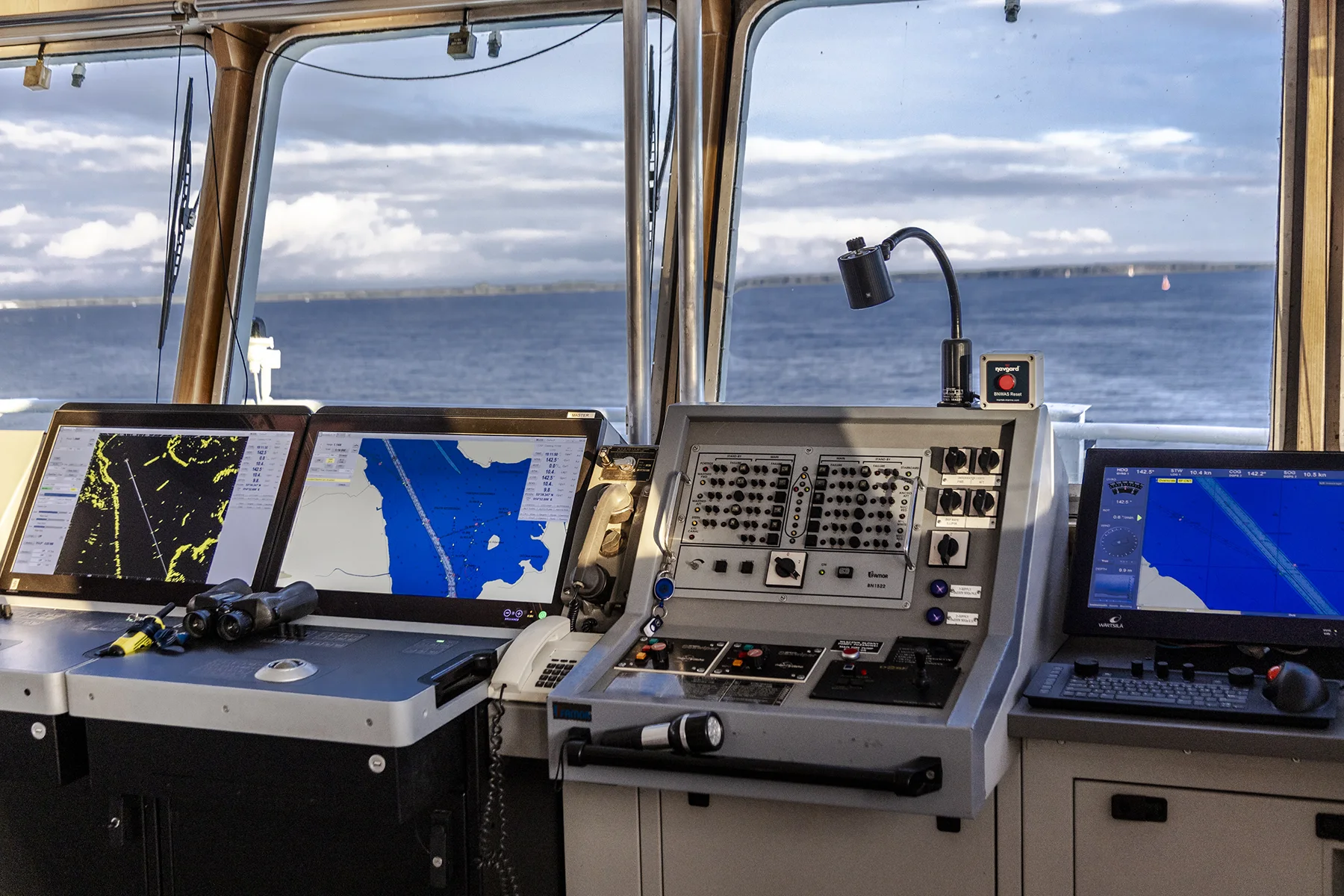
After acquiring maritime experience and the necessary work training, our graduates can easily find employment in land-based operational, technical, maritime administration services, port management, maritime classification and certification services and the maritime SAR (Search and Rescue) service.
The continuous process of implementing more and more autonomous control systems for operating equipment of the vessels will not eliminate the irreplaceable work of navigators – it will make their work easier, but responsibility for safe operations (navigation, loading and unloading) will remain placed on humans.
Programme of full-time studies >> Specialisation - Maritime Transport
Marine navigation courses are conducted by a highly skilled and experienced team of dedicated lecturers, with the help of the latest available technology used to train top-class engineers. Our students have access to modern equipped laboratories, training rooms, ship's bridge simulators and training and research vessel.
Our facilities and courses meet international standards requirements.
The graduates can apply for a job worldwide as our diplomas and degrees are recognized internationally.
Navigation courses provided by our University prepare the graduates for a wide spectrum of career opportunities in the global maritime economy.
The hands-on experience gained in the most heavily funded and fast-growing high-tech sector allows our students and graduates to acquire and develop a specific set of skills and knowledge to respond and adapt quickly to changes in the job market.
Before the satellite systems came into widespread use on land, sailors used them in their work on ships. The first prototypes of computers were utilized in science to calculate predictions of astronomical tides, which navigators analyse on a daily basis. Wind farms producing renewable energy - this is already an everyday part of a navigator's job. Your colleagues will lay fibre optic cables in the cities’ networks, you will use them to connect the continents.
You will get to know the powerful force of the ocean and sea, you will visit many countries, and you will get used to working in international teams, among people of different cultures and languages. Spread your wings, rise to a challenge, and follow your dreams with us, or you can choose a stable, straightforward career path with "feet on the ground". All these intentions are achievable on one condition - choose the right course of study - choose Navigation.
- Application form.
- Personal information form.
- Legalised /apostilled secondary school leaving certificate.*
- Uniform costs commitment form.
- STCW Medical Certificate for Service at Sea.
- English fluency certificate at least at B2 level.
- Two full-face photographs, 3.5 cm x 4.5 cm (the photographs should be identical, up-to-date, clear, showing a person’s face with no headcover or dark glasses, head in a left half-profile with the whole left ear visible, face evenly lit) photos are also required in digital version (as an attachment during the admission process on the MUS website). If there is a problem with attaching the photo, the MUS Admission Committee will upload it later.
- Application fee receipt (PLN 85).
- ID (for inspection only).
Polish candidates are required to apply via the University admission website - https://irk.pm.szczecin.pl/Default.aspx
Candidates may participate in several admission procedures, each time paying an admission fee. The admission fee for registration for one chosen course, level and form of studies is PLN 85.
To complete the application candidates for the programmes delivered in English may submit all their application documents in digital form only. However, on arrival to Poland, they must complete enrolment i.e. submit all application documents in original, paper versions. Candidates can also send their documents by post or by courier - details >> https://marine-edu.com/apply-now/
Polish citizens:
Należy dostarczyć dokumenty również w wersji papierowej, rekrutacja elektroniczna nie zwalnia z tego obowiązku!
Kandydaci, którzy uzyskają status "zakwalifikowanych do przyjęcia na studia" zobowiązani są do złożenia kompletu papierowych dokumentów.
Papierowe dokumenty rekrutacyjne należy dostarczyć do ....... 2026 r.:
- osobiście do Uczelnianej Komisji Rekrutacyjnej
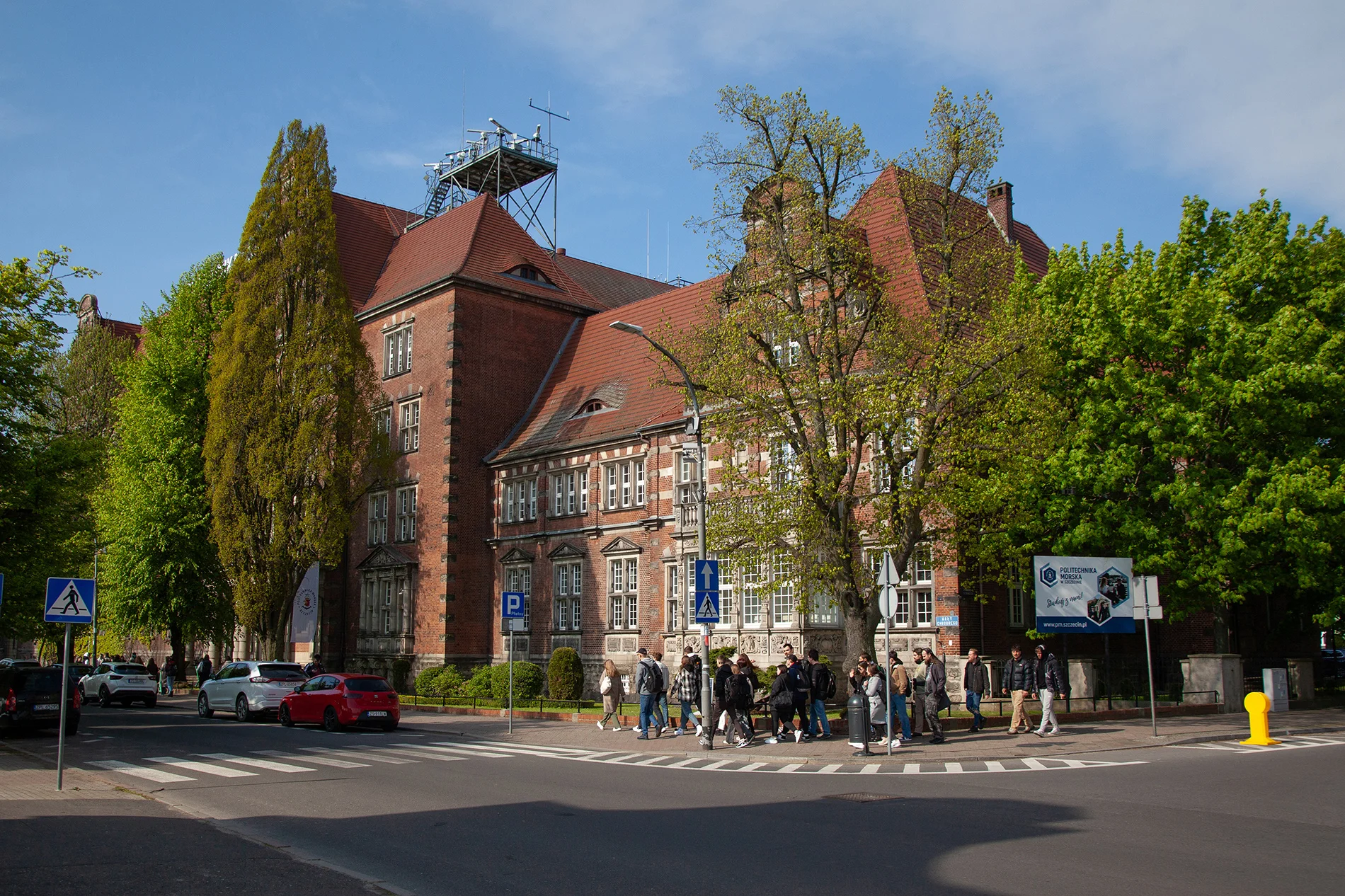 lub można wrzucić dokumenty (w teczce) do specjalnej skrzynki w przedsionku budynku
lub można wrzucić dokumenty (w teczce) do specjalnej skrzynki w przedsionku budynku
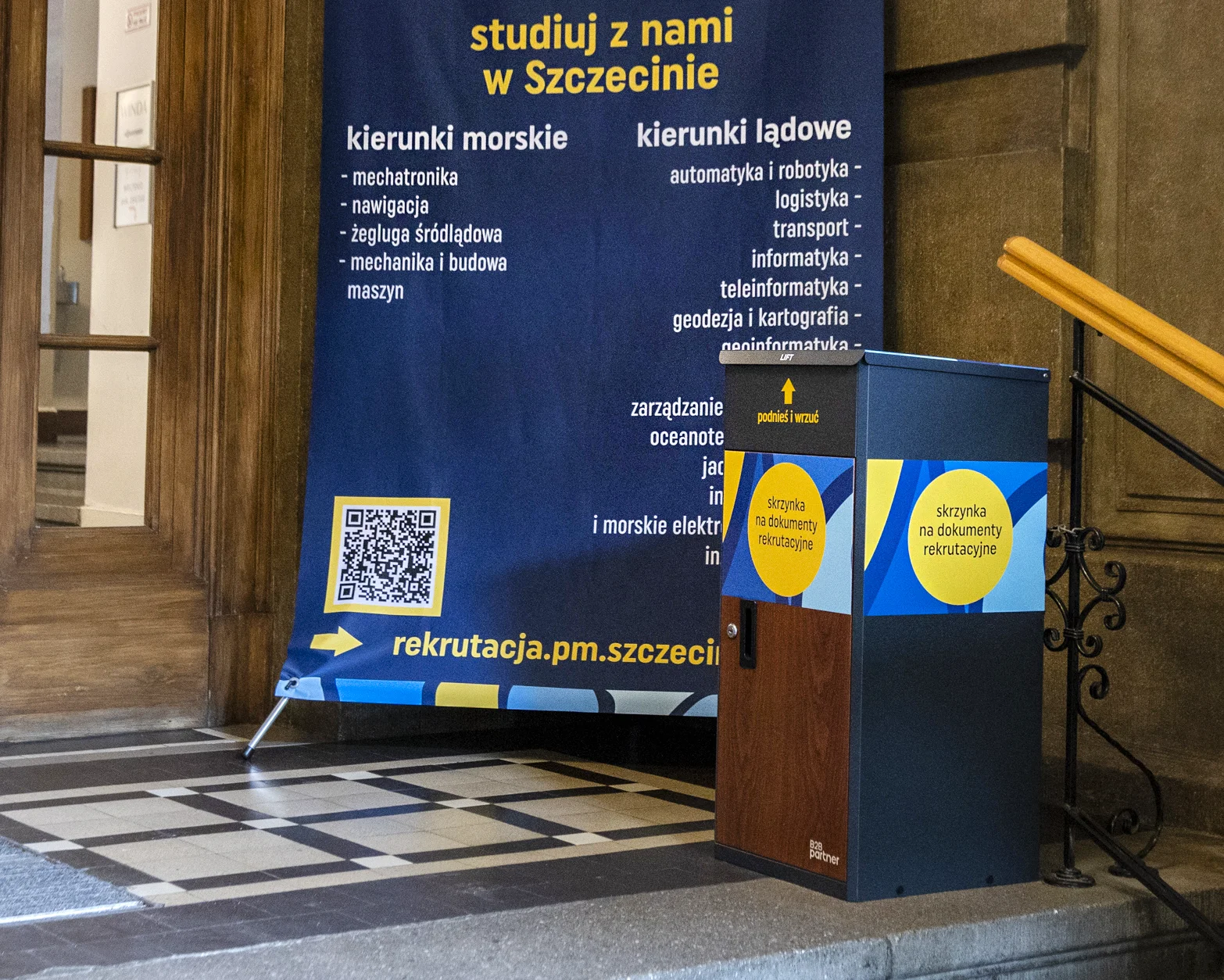
- lub za pośrednictwem operatora pocztowego / firmy kurierskiej
na adres:
Politechnika Morska w Szczecinie
REKRUTACJA
ul. Wały Chrobrego 1-2
70-500 Szczecin
Pliki do pobrania
| Admission aplication form for candidates - PDF |
| Personal information form MUS - PDF |
| Parent's lawful guardian's consent to study and undertake student interships - PDF |
| General Data Protection Regulation form MUS RODO Eng 2025 - PDF |
Admission fee: PLN 85.
Payment can be made at the University cash desk or directly to the Maritime University of Szczecin bank account:Bank Pekao S.A. 91 1240 3927 1111 0011 0575 2658
IBAN PL 91 1240 3927 1111 0011 0575 2658
SWIFT: PKOPPLPW
Tuition fees:
- Polish citizens - PLN 2,200 / semester.
- foreigners from outside the European Union – PLN 11,000 / semester.
- foreigners mentioned in article 324 (2) of the Polish Higher Education Act (EU citizens, Polish Card holders, Permanent Residence Permit holders, the decision of a Polish consul certifying one’s Polish origin, refugees, temporary protection, Temporary Residence Card holders - family reunification, holders of PKPZJPjO certificate on Polish language fluency at min. C1 level, spouse, child or parent of a Polish citizen living in Poland) – PLN 2,200 / semester.
Candidates may participate in several admission procedures, each time submitting a separate application fee. The application fee for one chosen course, level and type of study is PLN 85. In the event of a failure in admission for the main course, candidates will be automatically redirected to an alternative one.
Cash office open Mon - Fri 10.00 - 14.00.

Department for Admissions and International Affairs
Maritime University of Szczecin - Politechnika Morska w Szczecinie
ul. Wały Chrobrego 1-2, room 101
70-500 Szczecin, Poland
Check out our admission website for international candidates
tel. +48 91 48 09 965 (English, German)
tel. +48 91 48 09 345 (English, Spanish)
tel. +48 91 48 09 817 (Russian)
10.00 till 14.00 CET
tel. + WhatsApp: +48 601 329 781
fax: +48 91 48 09 831
email: international@pm.szczecin.pl
Polish-speaking candidates, please contact:
Uczelniana Komisja Rekrutacyjna
rekrutacja@pm.szczecin.pl
e-mail: dn@pm.szczecin.pl
tel. kom.: +48 663 370 144
What is Medical Certificate for Service at Sea?
Students of maritime courses - Navigation, Inland Navigation, Mechatronics and Mechanical Engineering will serve their internships on board ships, in order to do so, it is necessary to have Medical Certificate for Service at Sea in accordance with the STCW 1978 and MLC 2006 Conventions, which specify the health requirements to be met by a person working at sea. This is essential to ensure the safety of all crew members and to provide them with suitable working conditions. The health examination involves checking eyesight, hearing, balance, nervous system and general health.
Candidates for the Navigation course should submit to the International Students and Mobility Office:
- Medical Certificate for Service at Sea or
- medical certificate confirming that there are no health-related objections for the candidate to apply to a particular course, and the Medical Certificate for Service at Sea in accordance with the STCW 1978 and MLC 2006 Conventions can be obtained by the candidates after the closing of the admission period but before the beginning of the studies and must be submitted or sent to the Department for Admissions and International Affairs where you can get more information in case of queries.
tel. +48 91 48 09 965 (English)
tel. +48 91 48 09 345 (English, Spanish)
tel. +48 91 48 09 817 (Russian)
WhatsApp: +48601329781 (English, Russian) - available between 8.00am - 4:00pm CET
fax: +48 91 48 09 831
All candidates admitted to the course will be informed, in advance, about the commencement date of their internship.
Foreigners will start their internship on the date indicated by the Rector or by a person authorised by the Rector after the beginning of the academic year.Information on conditions and procedures referring to the initial internship:
1. The initial internship takes place at the Maritime Rescue Training Centre of the Maritime University of Szczecin (not applicable to foreigners) and lasts 2 weeks.
2. The Dean designates the date of the internship. It is possible to change the date of the internship, with the relevant request, when submitting the enrolment documents.
3. If you have certificates that are still valid for 2 years at the time you submit your enrolment documents, you can apply for exemption from the initial internship. The relevant request is required when submitting the enrolment documents. Photocopies of the certificates must be attached to the request.
4. Chargeable accommodation in the MUS dormitory is available for the duration of the internship.
5. Absence during the initial internship without an appropriate excuse will result in expulsion from the list.
